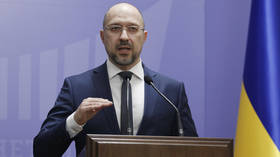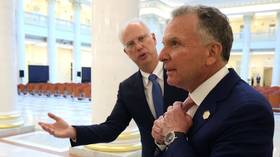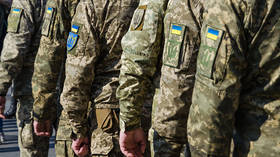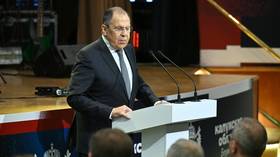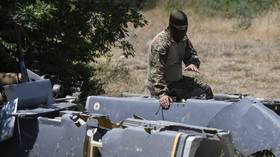'This will not be quick': Obama on Islamic State strategy
President Barack Obama said that, despite recent setbacks, the current US strategy would defeat Islamic State – but it won't happen fast. He blamed Congress for hindering the ongoing fight against ISIS by not approving a new terrorism sanctions czar.
After receiving a briefing on IS, the terrorist group also known as ISIS or ISIL, at the Pentagon on Monday, Obama lashed out at Congress for not confirming Adam Szubin, his nomination for the position of terrorism sanctions czar at the Department of Treasury, saying that the empty post hinders the US strategy against IS.
“If Congress really wants to help in this effort, they can confirm Mr. Adam Szubin, our nominee for Treasury undersecretary, to lead this effort” against IS, Obama said. “This is a vital position to our counterterrorism efforts. Nobody suggests Mr. Szubin is not qualified ‒ he’s highly qualified. Unfortunately, his nomination has been languishing up on the Hill, and we need the Senate to confirm him as soon as possible.”
Adam Szubin 1st testified before Congress as Acting Treasury Undersec for Terrorism in March http://t.co/dFo5GNHBG6pic.twitter.com/qBvxn7ib2P
— Craig Caplan (@CraigCaplan) July 6, 2015
Defense Secretary Ash Carter, Chairman of the Joint Chiefs of Staff Gen. Martin Dempsey and others briefed the president on the attempts to drive IS out of Iraq and Syria.
“Our mission to degrade and ultimately destroy the terrorist group ISIL… is a cause… that’s united countries across the globe ‒ some 60 nations, including Arab partners,” Obama told reporters after his briefing. “Our comprehensive strategy against ISIL is harnessing all elements of American power across our government: Military, intelligence, diplomatic, economic, development and ‒ perhaps most importantly ‒ the power of our values.”
"Ideologies are not defeated with guns, they’re defeated by better ideas" —@POTUS on countering violent extremism http://t.co/2q0Xm3sqaN
— The White House (@WhiteHouse) July 6, 2015
“This will not be quick,” Obama reiterated. “This is a long-term campaign. ISIL is opportunistic, and it is nimble. In many places in Syria and Iraq, including urban areas, it’s dug in among innocent civilian populations. It will take time to root them out. And doing so must be the job of local forces on the ground with training and air support from our coalition.”
In mid-June, the Department of Defense announced the expansion of the Taqaddum base in Iraq’s Anbar province. At the same time, Obama ordered 450 more troops to the base that is just 25 kilometers from Ramadi, the provincial capital, which fell into the hands of IS forces in May.
@OutFrontCNN@ChuckNellis@CNN Obama put on your big pants and go over there and tell Isis that face to face.. See if they like your ideas
— Gloria Prophet (@GloriaProphet) July 6, 2015
A week later, Carter admitted to Congress that the Pentagon has not been able to find enough “legitimate” Iraqi recruits to fight off IS extremists. At that point, the US military had trained some 9,000 Iraqi soldiers – far short of its 24,000-troop goal.
Obama noted that progress has been made in training and equipping Iraqi security forces, including Sunni volunteers, since the June announcement.
House Armed Services Committee Chairman Mac Thornberry (R-Texas) said that the briefing should lead Obama to conclude that the current strategy to defeat IS isn’t working.
"The President's afternoon at the Pentagon should lead him to the same conclusion I have reached from similar briefings; his strategy to defeat ISIL isn't working,” Thornberry said in a statement. “From Libya and Tunisia, to Afghanistan, ISIL continues to advance while we lose ground and time. I hope that the President will acknowledge these realities, end the veto threats on bills that would enhance his ability to take the fight to ISIL, and rethink his own inadequate strategy."
Obama disagreed with Thornberry’s assessment after meeting with his national security team.
"Our coalition has now hit ISIL with more than 5,000 airstrikes." —@POTUS: http://t.co/oDIQ2UMleKpic.twitter.com/Vmzq62HLRP
— The White House (@WhiteHouse) July 6, 2015
“As with any military effort, there will be periods of progress, but there are also going to be some setbacks, as we’ve seen with ISIL’s gains in Ramadi in Iraq and central and southern Syria. But today it’s also important for us to recognize the progress that’s been made,” the president said. “Our coalition’s now hit ISIL with more than 5,000 airstrikes. We’ve taken out thousands of fighting positions, tanks, vehicles, bomb factories and training camps. We’ve eliminated thousands of fighters, including senior ISIL commanders. And over the past years, we’ve seen that, when we have an effective partner on the ground, ISIL can be pushed back.”
Obama says: As I have said for two years now, ISIS will win, lose, win, and then win, and we lose some, and they win more...
— Joe FreedomLover (@JoeFreedomLove) July 6, 2015
Obama pointed out that IS has faced a series of losses in Iraq and Syria, which “prove that ISIL can and will be defeated.” He outlined the US and coalition strategy against the terror group, including cracking down on the group's illicit finance operations around the world.
"ISIL’s recent losses in both Syria and Iraq prove that ISIL can & will be defeated." —@POTUS: http://t.co/oDIQ2UMleKpic.twitter.com/jqonlRKHYa
— The White House (@WhiteHouse) July 6, 2015
“We’re intensifying our efforts against ISIL’s base in Syria. Our airstrikes will continue to target their oil and gas facilities that fund so much of their operations. We’re going after the ISIL leadership and infrastructure in Syria, the heart of ISIL that pumps funds and propaganda to people around the world,” he said. “Partnering with other countries, sharing more information, strengthening laws and border security, allows us to work to stem the flow of foreign fighters to Syria ‒ as well as Iraq ‒ and to stem, obviously, the flow of those fighters back into our own countries.”
Obama also called on both Syria and Iraq to form inclusive governments that serve all groups within their countries. The president praised Iraqi Prime Minister Haider Abadi’s steps, supported by the US, “to forge an inclusive and effective Iraqi government that unites all the people of Iraq.” Meanwhile, he once again called for Syrian President Bashar Assad to step down.
“In Syria, the only way that the civil war will end ‒ and end in a way so the Syrian people can unite against ISIL ‒ is an inclusive political transition to a new government without Bashar Assad ‒ a government that serves all Syrians,” Obama said.





